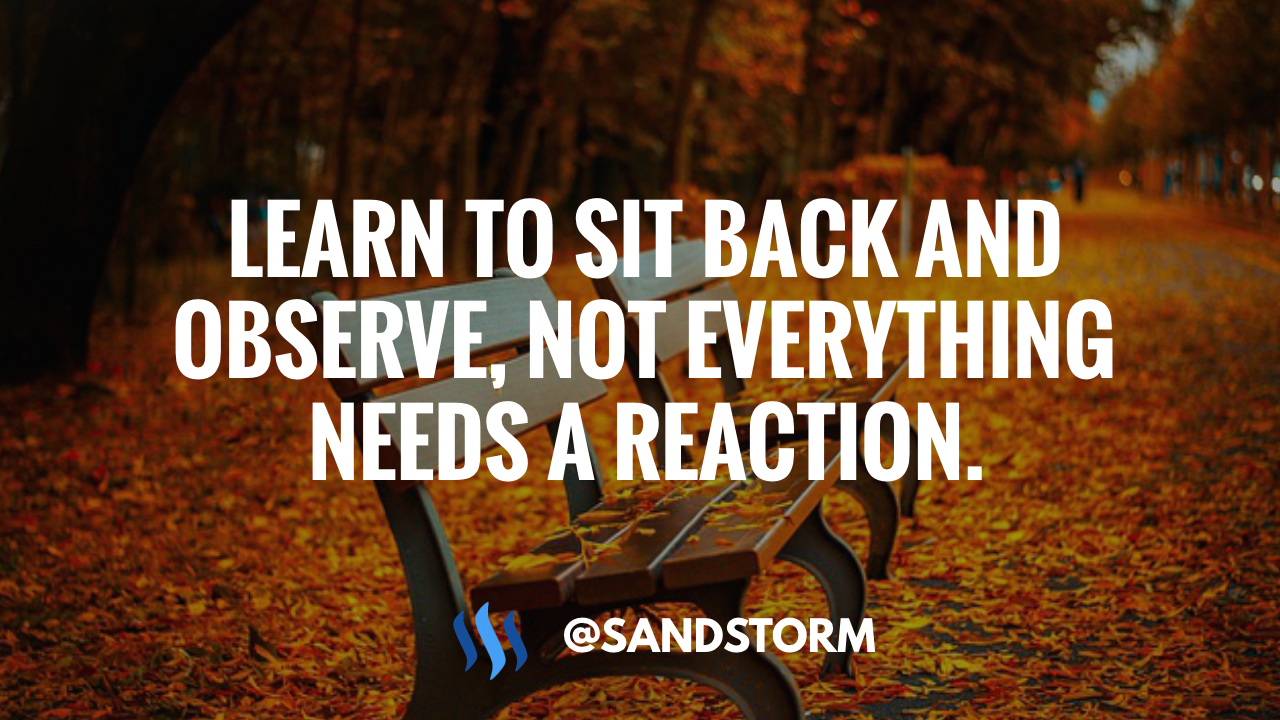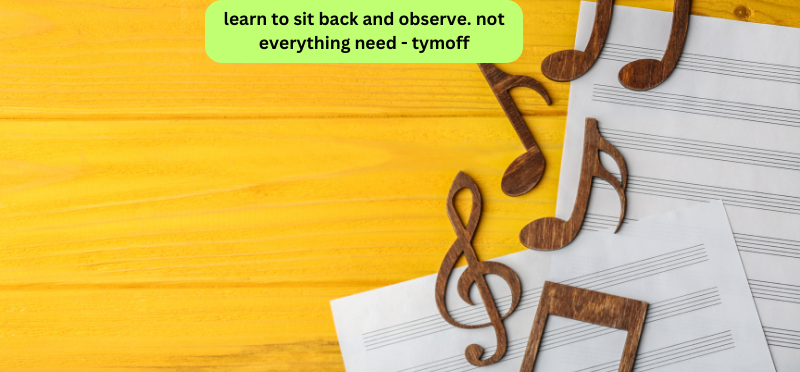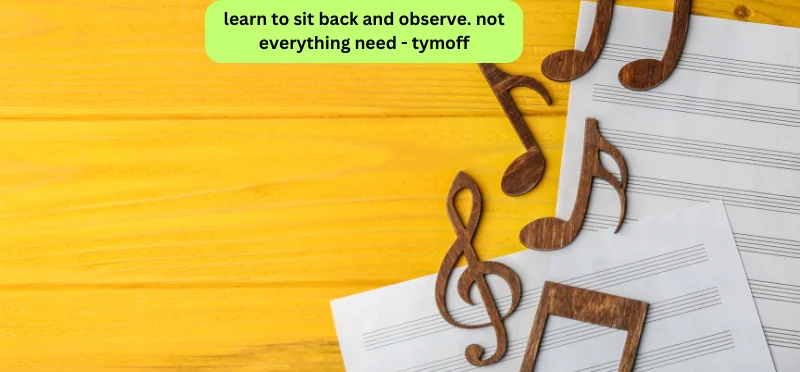In our fast-paced and hectic lives, the concept of taking a step back and simply observing seems almost alien. The constant pressure to be productive and the ever-increasing demands of modern life can leave us feeling overwhelmed and exhausted.
However, amidst the chaos, there is a valuable lesson to be learned – the art of learn to sit back and observe. not everything need – tymoff. This practice challenges the prevailing notion that every aspect of life requires time off and invites us to consider a more nuanced approach to our daily existence.

The Rush of Modern Life: learn to sit back and observe. not everything need – tymoff
In the digital age, where information travels at the speed of light and communication is instantaneous, it’s easy to get caught up in the whirlwind of constant activity. The incessant notifications, the pressure to meet deadlines, and the relentless pursuit of success can create an environment where the idea of taking a break is often dismissed as a luxury. The result? Burnout, stress, and a pervasive sense of dissatisfaction.
The Need for Reflection: learn to sit back and observe. not everything need – tymoff
Amidst this chaos, the need for reflection becomes paramount. learn to sit back and observe. not everything need – tymoff allows us the space and time to reflect on our lives, our choices, and our goals. It’s an opportunity to gain perspective and assess whether the path we’re on aligns with our true values and aspirations. Without this introspective pause, we risk becoming mere spectators in our own lives, swept along by the currents of societal expectations and external pressures.
must read= Fortitude of the Nightborne Armor Set | ganztägiges osttor des himmels im lempuyang tempel
Observation as a Learning Tool:
Observation is not passive; it is an active process that involves keen attention and an open mind. By cultivating the habit of observing, we become learners in the grand classroom of life. Every situation, every interaction, and every challenge becomes an opportunity to glean insights and wisdom. In the rush to forge ahead, we often overlook the valuable lessons that the present moment holds. learn to sit back and observe. not everything need – tymoff allows us to tap into this wellspring of knowledge that surrounds us.

The Myth of Constant Productivity: learn to sit back and observe. not everything need – tymoff
The prevailing belief that every waking moment must be dedicated to productivity is a myth that needs debunking. Rest, relaxation, and leisure are not mere indulgences; they are essential components of a balanced and fulfilling life. Ironically, it is during moments of apparent inactivity that creativity often flourishes, and breakthrough ideas emerge. By learning to appreciate the ebb and flow of life, we can break free from the shackles of constant productivity and embrace the natural rhythm of our existence.
Cultivating Mindfulness: learn to sit back and observe. not everything need – tymoff
The practice of sitting back and observing is closely linked to the concept of mindfulness. Mindfulness involves being fully present in the moment without judgment. It is a state of heightened awareness that allows us to appreciate the richness of our experiences. By incorporating mindfulness into our daily lives, learn to sit back and observe. not everything need – tymoff navigate the challenges with greater ease and savor the joys with a deeper sense of gratitude. Mindfulness is not a luxury but a necessity for maintaining our mental and emotional well-being.
Balancing Action and Contemplation: learn to sit back and observe. not everything need – tymoff
Life is a delicate dance between action and contemplation. While action propels us forward and helps us achieve our goals, contemplation provides the necessary pause for reflection and course correction. The key is to strike a balance between the two, recognizing that they are interdependent rather than mutually exclusive. learn to sit back and observe. not everything need – tymoff is not a rejection of action but a strategic pause that enhances the effectiveness of our endeavors.

Conclusion:
In a world that often glorifies constant business, the art of sitting back and observing is a skill worth cultivating. It is a gentle reminder that not everything needs time off, but rather, it requires a thoughtful and intentional approach. By embracing the power of observation, we can navigate the complexities of life with greater wisdom, make informed decisions, and find fulfillment in the journey rather than being fixated solely on the destination. So, let us learn to sit back and observe. not everything need – tymoff and appreciate the beauty of the unfolding tapestry of our lives.
FAQ on Learning to Sit Back and Observe: Not Everything Needs Time Off
Q1: Why is it important to learn to sit back and observe?
A1: Learning to sit back and observe allows you to gain perspective and understanding before taking action. It helps in making informed decisions and avoids impulsive reactions.
Q2: What does “Not everything needs time off” mean?
A2: It suggests that while observation is crucial, not every situation requires prolonged inactivity. Some issues may need immediate attention, and the key is to discern when action is necessary and when patience is more appropriate.
Q3: How can I develop the skill of observing without immediate action?
A3: Start by consciously taking a moment to observe before reacting. Practice mindfulness techniques, such as deep breathing, to help you stay present and avoid impulsive decisions.
Q4: Are there situations where immediate action is necessary, even if I’m practicing observation?
A4: Yes, emergencies or critical situations may demand prompt action. The idea is to strike a balance between thoughtful observation and timely responsiveness.
Q5: How can observing benefit personal relationships?
A5: Observing in relationships allows you to better understand others’ perspectives, feelings, and needs. It promotes effective communication and helps in resolving conflicts more thoughtfully.
Q6: What if I find it challenging to sit back and observe without getting anxious or restless?
A6: It’s normal to feel uneasy initially. Practice relaxation techniques, remind yourself of the benefits of observation, and gradually increase the duration of your observation periods.
Q7: Can observing be applied in professional settings?
A7: Absolutely. In the workplace, observing before making decisions can lead to better problem-solving and more strategic planning. It also fosters a collaborative and understanding work environment.
Q8: How do I distinguish between situations that require immediate action and those that can be observed?
A8: Consider the urgency and potential consequences of the situation. If swift action is crucial and the impact is significant, act promptly. Otherwise, take the time to observe and gather information.




